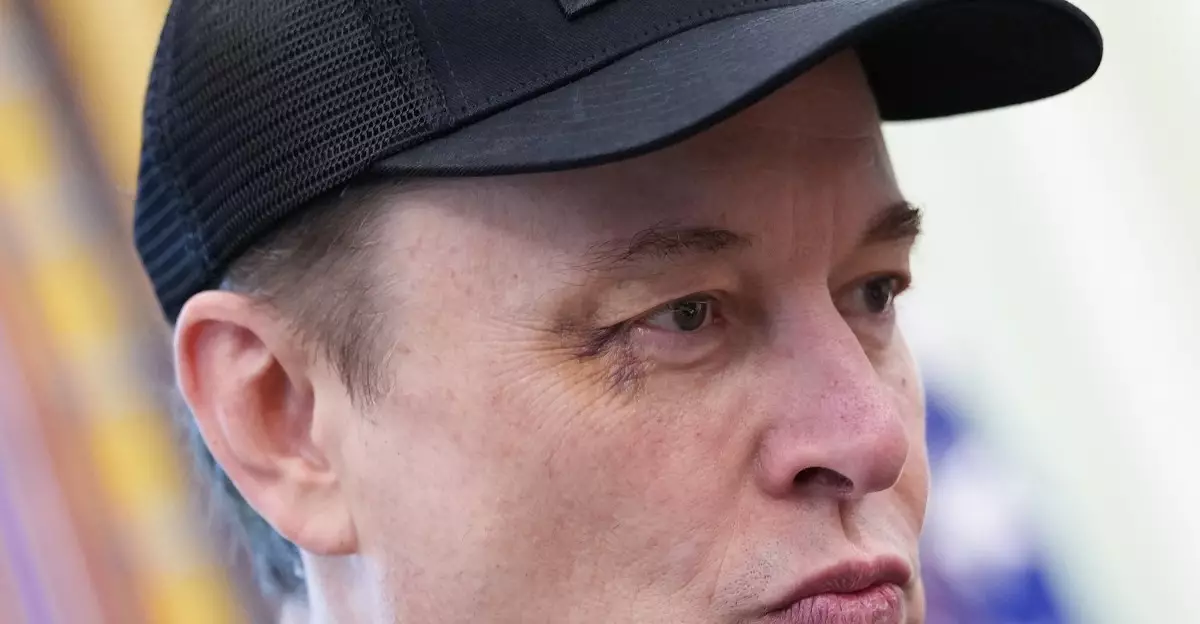In a recent press conference that seemed to overshadow any promotional narrative, Elon Musk stood beside President Trump, sporting a noticeable black eye—the result of what he humorously blamed on a playful encounter with his young son. However, this comical facade belied the real turmoil dwelling in Musk’s professional life. After a tumultuous five-month tenure at the Department of Government Efficiency (DOGE), Musk is grappling with a myriad of challenges that stretch well beyond just cosmetic bruises. From eroding market share at Tesla to a decline in public favor, Musk’s exit raises significant questions regarding both his personal brand and the future of DOGE.
While Musk insists that “DOGE will live on,” the reality presents a more sobering view. Following a series of controversial decision-making processes, including heavy cuts to humanitarian aid, which some experts link to significant humanitarian crises, DOGE’s efficiency metrics are under the microscope. Musk’s self-proclaimed achievement of saving taxpayers a trillion dollars has raised eyebrows, with analysts quickly debunking such claims. Instead, reports indicate that the cost of DOGE’s initiatives may have led to administrative inefficiencies amounting to an estimated $135 billion loss, a controversial trade-off for Musk’s vision of government thriftiness.
The Costs of Efficiency: Scrutinizing DOGE’s Achievements
What ensued during Musk’s leadership at DOGE raises critical questions about the efficacy of his strategies. Although he champions the narrative of slashing inefficiency, the records reveal that the organization merely reported $160 billion in reductions—significantly below the projected goals. This discrepancy has drawn criticism from policy analysts, who assert that the true implications of Musk’s policies may ultimately undermine public trust in government operations.
Moreover, DOGE’s legacy appears marred by a cycle of layoffs and rehiring, a tumultuous practice that undermined morale and productivity in various government sectors. Reactions from within the government suggest that Musk’s aggressive cost-cutting measures may have ultimately impeded rather than facilitated effective governance. This crux of his administration’s legacy is not merely a fiscal narrative; it embodies the repercussions of what can occur when radical efficiency meets the political landscape.
A Personal and Professional Crossroads
As Musk shifts away from government authority, his dwindling stock prices at Tesla reflect imminent challenges that loom larger than political narratives. Currently, Tesla is faced with its first year-over-year sales plunge in nearly five years, and with growing public disdain towards Musk amplified by recent controversies, the survival of his entrepreneurial ventures seems precarious. Industry insiders suggest that Tesla’s board is already in search of a new chief executive, potentially marking an exit from leadership that few predicted for someone deified in the tech space.
Despite Musk portraying his tenure in DOGE as a “beginning” rather than an end, the complexities of his ambitious claims come with considerable doubts. Supporters still see a visionary; critics argue that with visionary ambition can come reckless disregard for foundational stability. Musk’s declaration of DOGE being a “way of life” sounds more like a rallying cry for loyalists rather than a solid assessment of the agency’s outcomes.
The Broader Implications: Growth without Foundation?
In the midst of high-profile collaborations and public displays of camaraderie with political figures, the underlying facets of governance include concerns for accountability, transparency, and efficacy—all areas where Musk has found himself under scrutiny.
The optimistic portrayal from the Trump administration, which presented Musk with symbolic accolades, stands in stark contradiction to the discontent that appears to be brewing at Tesla and DOGE. Market analysts and political commentators alike are pondering whether Musk’s innovative disruptions and bold visions will materialize into sustainable growth or become mere footnotes in a broader narrative of corporate mismanagement.
In a world increasingly wary of excessive ambition devoid of groundwork, the fates of Musk’s enterprises—and perhaps even the very nature of governance itself—hang in a delicate balance. The upcoming chapters in Musk’s life promise moments of acclaim and chaos, but whether they signify true progress remains open for interpretation.

